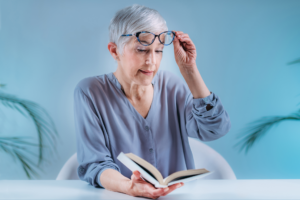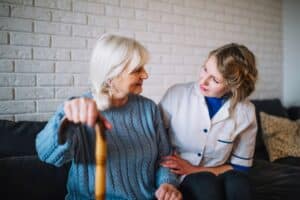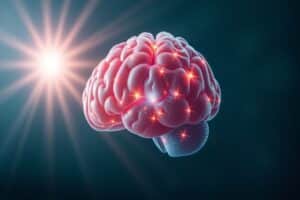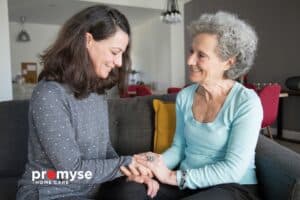If you think your loved one is having a stroke, every minute counts! It is important to understand the signs and symptoms of stroke, so you can take quick action and hopefully save a life.
Different parts of your brain control different parts of your body, and symptoms will depend on the part of the brain affected.
Reference: How the Brain Works (Heart and Stroke)
Signs and symptoms to look for:
- Weakness or numbing in the face, arm, leg, or one side of the body.
- Confusion, or difficulty understanding speech or trouble speaking.
- Difficulty with vision.
- Feeling dizzy, loss of balance, or lack of coordination.
- Sudden severe headache with no known cause.
It’s essential to be aware of these signs, particularly if you live with or care for a person in a high-risk group, such as a senior loved one with diabetes or high blood pressure.
The CDC (Centers for Disease Control and Prevention) suggests the following:
If you think someone is having a stroke, use the F.A.S.T. test:
Face: Ask the person to smile and note if one side of the face droops.
Arms: Get the person to raise both arms and watch if one arm is lower than the other.
Speech: Watch to see if the speech is slurred or strange.
Time: Call 9-1-1 right away if any of these symptoms are showing. It helps the health care providers to know the time the symptoms started so that they can determine the best treatment.
It is best to have medical personnel on hand to start treatment immediately, so calling 9-1-1 is the best option rather than attempting to get to a hospital on your own.
Do not drive to the hospital or let someone else drive you. Call 9-1-1 for an ambulance so medical personnel can begin life-saving treatment on the way to the emergency room.
Prevention of a Stroke
One of the best routines to help prevent a stroke is to eat healthy, exercise, and avoid smoking and drinking too much alcohol.
Diet
A balanced diet is essential. A low-fat, high-fibre diet is recommended, with plenty of fresh fruit, vegetables, and whole grains. Monitor foods high in salt and processed foods.
Exercise
Even mild strokes can affect a person’s balance, increasing the risk of falling. Strengthening core muscles supports balance, and simple exercises like a seated balance exercise or a seated twist are great for seniors to incorporate into their stroke recovery.
Caring for a senior loved one can be challenging and overwhelming, but you don’t have to face it alone.
Recovery At Home
The professional caregivers at Promyse Home Care can offer the support and guidance needed to help your senior loved one remain safe and comfortable as they recover in the comfort of their own home. They can offer independence by providing cooking, laundry, and medication management services.
Recovering at home from a stroke has been proven to increase positive outcomes. If your parent or loved one needs ongoing care at home after a stroke, the healthcare team at Promyse is there to help.
Our Personal Support Workers, managed by a Nurse Case Manager, deliver high-quality care. We provide care according to the needs of your loved one, from daily visits to around-the-clock care.



